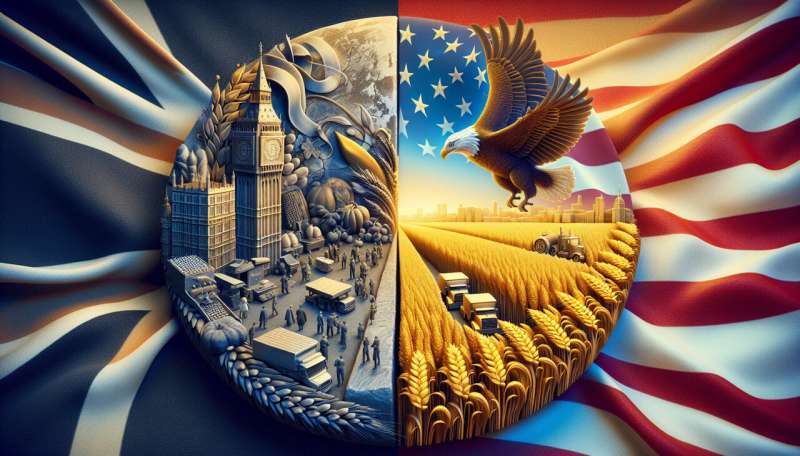In a world where every bite of food we take is connected to much larger issues, a new trade deal between the UK and the US has sparked a lively debate about food standards, safety, and local farmers. This article delves into the implications of this deal and how it could affect the plates of families across Britain. Let’s explore the heart of this matter, where science, community, and health intertwine!

A recent trade agreement between the UK and the US has prompted numerous voices, including concerned farmers and food safety advocates, to express their worries. The deal opens the doors to US agricultural products—think beef and ethanol—entering the UK market with unprecedented ease. While some see it as a promising opportunity, others raise flags about potential risks to local agricultural practices and consumer health.
Supporters of the deal tout it as a fresh start after a period of stalled negotiations. However, critics fear that it could undermine Britain’s food standards. The prospect of cheaper US imports may tempt cash-strapped consumers, but what might we lose in the long run? The UK government assures that products like hormone-treated beef and chlorine-washed chicken won’t make it across the pond, yet skepticism lingers regarding these promises amid the complexities of trade negotiations.
Public sentiment in the UK strongly favors maintaining high food safety standards. Surveys indicate a significant portion of the population is firmly against importing hormone-treated or chlorinated meats, demonstrating a collective value for animal welfare and food safety. If the UK shifts toward more lenient standards reminiscent of US practices, we could see a backlash from the very consumers the trade deal is designed to benefit.
The wording of the trade deal, which mentions “enhancing agricultural market access,” raises eyebrows. This could potentially set the stage for further adjustments that chip away at established food safety standards, inviting a slow but steady erosion of the protections that many hold dear.
Under this new agreement, the UK is slated to allow 13,000 tons of US beef in without tariffs—a significant increase from its previous limit of just 1,000 tons. This exchange means U.S. beef will compete directly with UK beef, which is raised under stricter welfare and environmental regulations. Many farmers worry that cheaper meat from the US, despite being hormone-free, could undercut their livelihoods.
The National Farmers’ Union (NFU) has highlighted substantial fears within the farming community regarding the potential economic fallout from this trade deal. The prospect of American feedlot beef flooding the market could spell disaster for British farmers who firmly adhere to higher welfare standards. Even with assurances from major supermarket chains to maintain sourcing from British farms, there are apprehensions over the potential spread of US beef into wholesale and catering sectors.
Another contentious point involves ethanol, a biofuel usually derived from crops like corn, which is often used as a petrol additive. Under the new deal, the UK has lowered tariffs on US corn ethanol, raising concerns that domestic bioethanol plants, which play a vital role in local farming, could suffer financially. These plants are key to many rural economies, purchasing British crops for their production, and their instability might ripple through affected communities.
While the thought of lower grocery bills is appealing to many British families, particularly those navigating high food inflation rates, we must remember that not all cheap food is nutritious. The government has been pushing for reduced red meat consumption for health reasons, and increased access to cheaper beef risks pushing consumption beyond recommended levels. More red meat might sound good for the budget, but it raises serious health questions.
Henry Dimbleby, formerly a lead strategist for the UK government on food, has pointed out that compromising domestic standards for short-term savings could lead to longer-term health and environmental issues. His warnings resonate strongly, particularly as the nation seeks to strike a balance between affordability and community well-being.
Food: Not Just A Commodity
Beyond just trade, food denotes our values regarding health, environmental stewardship, and rural life. The NFU raises a crucial point: food is more than just another item on a shelf—it’s a matter of public health and community welfare. The deal might point toward more imports of ultra-processed foods, which, while not necessarily harmful, could exacerbate the ongoing health crisis of obesity and diabetes if available indiscriminately.
In summary, while the UK government maintains it has safeguarded food protections while paving the avenue for enhanced trade, the critical test will be whether the outcome translates into real benefits for both consumers and farmers. Whether supermarkets can genuinely uphold commitments to local sourcing, and how regulators cope under pressure from US agribusiness, will be pivotal in shaping the future of food in Britain. What truly matters is that any trade agreement enriches our plates with safe, healthy, and fair food for everyone.
This article is republished from The Conversation under a Creative Commons license. Read the original article.![]()
If you would like to see similar science posts like this, click here & share this article with your friends!





